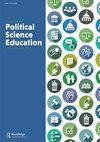国家发展模拟在线教学体验解决问题
IF 0.6
Q3 POLITICAL SCIENCE
引用次数: 1
摘要
本教学笔记概述了一种创新的模拟游戏,以响应大流行后的体验式学习需求。游戏介绍了一个正在经历一系列政治和金融冲击的虚构非洲国家。学生被分配为社会群体的成员,并且必须执行能够改善其群体和国家成果的国家政策。在每周的在线互动会议上,学生们讨论这些拟议的政策,然后集体投票决定。反过来,这一决定导致了接下来一周的情况。这款游戏的教育目标是为学生提供一个平台,让他们通过包容性的方法,对现实世界的挑战进行分析和参与决策。该课程旨在增强发展中国家学生的自学能力和领导潜力,并为全球学生的非殖民化参与式政治学教育迈出了有意义的一步。此外,它将距离从学习障碍转变为合作解决问题的宝贵机会,当代政治和经济现实构成了课程。本文章由计算机程序翻译,如有差异,请以英文原文为准。
A National Development Simulation Online to Teach Experiential Problem-Solving
Abstract This teaching note outlines an innovative simulation game realized in response to post-pandemic experiential learning needs. The game introduces a fictional African country experiencing a series of political and financial shocks. Students are assigned membership in social groups and must implement the national policies that would improve outcomes for their group and the country. During weekly online interactive sessions, students debate these proposed policies before voting on a collective decision. In turn, that decision leads to the following week’s scenario. The game’s educational goal is to offer students a platform for analytical and engaged decision-making about real-world challenges through inclusive andragogy. The course is designed to empower self-learning and augment leadership potential for students from developing countries and serves as a meaningful step forward for decolonizing engaged political science education for students globally. Moreover, it transforms distance from a learning barrier to a valuable opportunity for collaborative problem-solving, with contemporary political and economic realities constituting the curriculum.
求助全文
通过发布文献求助,成功后即可免费获取论文全文。
去求助
来源期刊

Journal of Political Science Education
POLITICAL SCIENCE-
CiteScore
1.80
自引率
36.40%
发文量
69
期刊介绍:
The Journal of Political Science Education is an intellectually rigorous, path-breaking, agenda-setting journal that publishes the highest quality scholarship on teaching and pedagogical issues in political science. The journal aims to represent the full range of questions, issues and approaches regarding political science education, including teaching-related issues, methods and techniques, learning/teaching activities and devices, educational assessment in political science, graduate education, and curriculum development. In particular, the journal''s Editors welcome studies that reflect the scholarship of teaching and learning, or works that would be informative and/or of practical use to the readers of the Journal of Political Science Education , and address topics in an empirical way, making use of the techniques that political scientists use in their own substantive research.
 求助内容:
求助内容: 应助结果提醒方式:
应助结果提醒方式:


